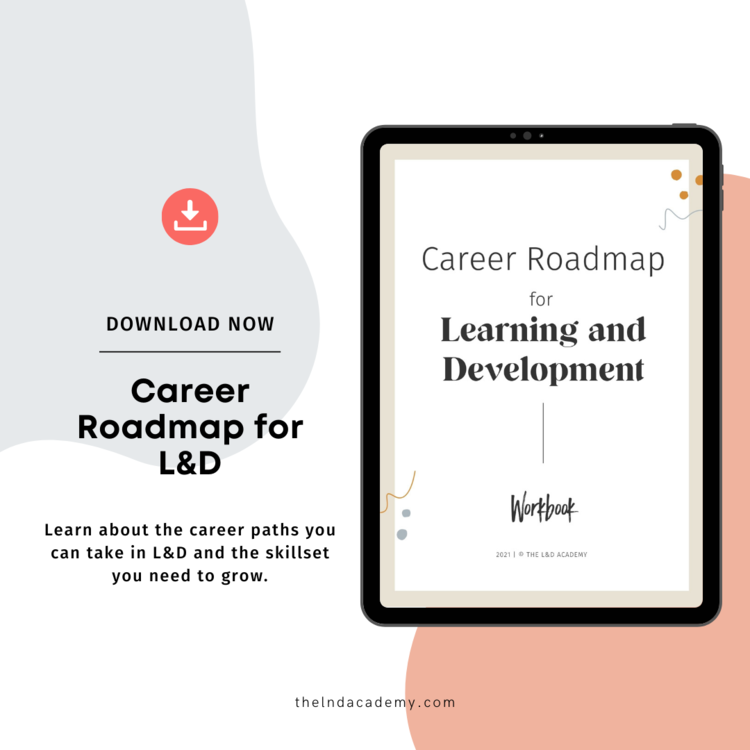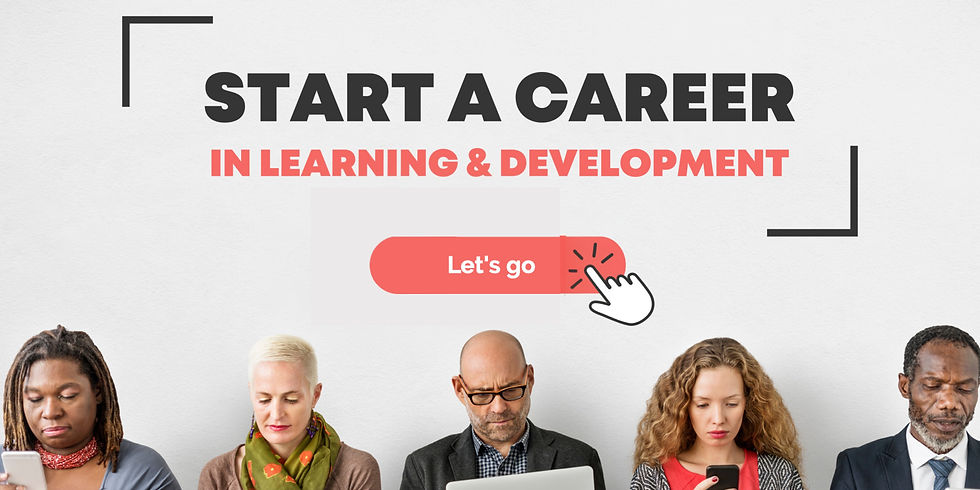Is Learning and Development the Right Career Choice for You?
- Raya Manova

- Feb 7, 2024
- 5 min read
Updated: Jan 8, 2025
So, you’re considering a career in Learning and Development! You’ve seen some videos online, you’ve spoken to people from the business, you’ve attended a couple of trainings or webinars. But you still have some doubts – is L&D the right career choice for you?
To help you decide, it would be useful to get a glimpse into what skills are required as an L&D practitioner, what would be expected from you daily, and the potential career paths you can take.
What career paths are available in L&D?
Let’s start with some basics – Learning and Development isn’t a single role; it’s an umbrella term for a tapestry of roles. Sometimes, these roles will be performed by different people, sometimes the L&D team will consist of 1 person, and they will need to don many different hats.
We recently came across a couple of wonderful posts about this, you can check them out here:
Both of these posts (and the comments below them) mention 35 different L&D roles. Here is an alphabetical list of those with some very brief descriptions:
Animator/motion graphics designer – Creates engaging visual content to enhance learning materials.
Coach – Provides personalized guidance to support personal and professional development.
Community Manager – Fosters learning communities, encouraging collaboration and knowledge sharing.
Content Designer – Designs educational content with a focus on learner engagement.
Content Strategist – Plans (and executes) content strategy to meet learning objectives.
Content Writer – Crafts informative and compelling written materials for learning.
Corporate Trainer – Delivers training programs within corporate settings.
Facilitator – Guides group learning processes to encourage participant engagement.
Game Designer – Develops educational games to make learning interactive and fun.
Graphic / Visual Designer – Creates visual elements to support and enhance learning content.
Head of Learning and Development – Oversees the L&D department, setting strategies and goals.
Instructional Designer / eLearning Developer – Designs and develops online educational modules (eLearning).
Internal Communications Manager – Manages internal messaging to support L&D initiatives.
Leadership Development Specialist – Focuses on developing leadership skills within the organization.
Learning and Development Administrator – Manages L&D-related finance, procurement, budgeting, and other administrative tasks.
Learning and Development Business Partner – Aligns L&D strategies with business goals.
Learning and Development Manager – Leads the development and implementation of L&D programs.
Learning and Development Program Manager – Oversees specific L&D programs, ensuring their success.
Learning and Development Project Manager – Manages L&D projects from inception to completion.
Learning and Development Specialist – Specializes in developing and delivering learning content.
Learning Experience Designer – Designs immersive and effective learning experiences.
Learning Management System Administrator – Manages the LMS to ensure smooth delivery of online training.
Learning Measurement Analyst – Analyzes data to measure the impact of L&D initiatives.
Learning Operations Manager – Oversees the operational aspects of the L&D function.
Learning Solutions Architect – Designs comprehensive learning solutions to meet organizational needs.
Learning Technology Lead – Guides the adoption and use of learning technologies.
Learning Transfer Agent – Ensures learning is effectively applied in the workplace.
Onboarding Specialist – Designs and delivers programs to integrate new hires.
Special Projects Manager – Manages unique L&D projects with specific goals.
Team Development Specialist – Focuses on enhancing team dynamics and performance through targeted training and other interventions.
Technical Writer – Develops clear and concise technical documentation for learning purposes.
Training Delivery Manager – Oversees the delivery of training programs to ensure effectiveness.
Training Facilitator – Leads training sessions, promoting active learning and participation.
UX Designer – Designs user-friendly learning platforms and materials.
Video editor/producer – Creates and edits videos to support learning content.
What skills are needed to work in Learning and Development?
The work of any L&D specialist requires a diverse set of skills, blending both technical expertise and soft skills to effectively foster growth and development within organizations. If you’re considering a career in L&D, check if you have some of the essentials: strong communication, creativity, adaptability, interpersonal skills, collaboration, analytical and strategic thinking. Then, consider the more L&D-specific ones, like instructional design principles, adult learning theories, project management, facilitation, technology proficiency and project management.
For a full list of required skills and knowledge, check out our L&D Competency Inventory.
What degree do you need to start in L&D?
Historically, Learning & Development emerged in the US during and after World War II. This means it’s pretty young as a field, and it’s only recently that universities have started introducing degrees in Learning & Development. That being said, you don’t necessarily have to pursue higher education to get the knowledge and skills needed to get a job in this field.
There are several institutions, as well as online education platforms that offer certifications in L&D, with some of them even free.
Coursera
Coursera offers online video courses from universities around the world. Some of them are free and you only pay for your certification in the end, if you’d like to. Here are some courses to get you introduced to the topic of Learning, training, and employee development.
Udemy
Udemy is another option when it comes to online learning and you can get a fantastic start with one of their top-rated courses in L&D (some created by our very own Irina Ketkin): 💻 Introduction to Learning and Development
Futurelearn
If you’re considering a career in education, rather than corporate training, then Futurelearn offers some great introductory courses in Instructional Design and Educational Neuroscience.
The L&D Academy
Not to toot our own horn, but we’ve put together the most practical, informative, and helpful course on ‘Learning & Development Fundamentals’. You get access to it as soon as you sign up and you learn at your own pace.
(Pssst… To secure 10% off, make sure you sign up for our newsletter below!)
If a formal certificate or diploma is important to you…
There are some pricier options out there, (think upwards of $3300) such as CIPD L&D Diploma and ATD Certification Courses in L&D, but before you make such a big time and money investment, we strongly suggest you start with one of the courses above, to get a feel of Learning & Development and if it is the field for you, at all.
Start a career in L&D - mini-course
We prepared a 5-day video guide to help anyone looking to switch lanes and start a career in Learning and Development. Learn what it takes to become a successful L&D practitioner and what steps you can take to set yourself up for success.





